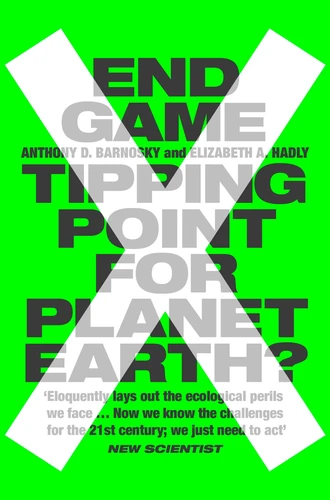End Game. Tipping Point for Planet Earth?
Par : ,Formats :
Disponible dans votre compte client Decitre ou Furet du Nord dès validation de votre commande. Le format ePub protégé est :
- Compatible avec une lecture sur My Vivlio (smartphone, tablette, ordinateur)
- Compatible avec une lecture sur liseuses Vivlio
- Pour les liseuses autres que Vivlio, vous devez utiliser le logiciel Adobe Digital Edition. Non compatible avec la lecture sur les liseuses Kindle, Remarkable et Sony
- Non compatible avec un achat hors France métropolitaine
 , qui est-ce ?
, qui est-ce ?Notre partenaire de plateforme de lecture numérique où vous retrouverez l'ensemble de vos ebooks gratuitement
Pour en savoir plus sur nos ebooks, consultez notre aide en ligne ici
- Nombre de pages272
- FormatePub
- ISBN978-0-00-754816-3
- EAN9780007548163
- Date de parution02/07/2015
- Protection num.Adobe DRM
- Infos supplémentairesepub
- ÉditeurWilliam Collins
Résumé
What happens when vast population growth endangers the world's food supplies? Or our water? Our energy needs, climate, or environment? Or the planet's biodiversity? What happens if these all become critical at once? Just what is our future?
In End Game, world-renowned scientists Anthony Barnosky and Elizabeth Hadly explain the growing threats to humanity as the planet edges towards a resource war for remaining space, food, oil and water.
And as they show, these wars are not the nightmares of a dystopian future but are already happening today. They explore the origins of Ebola in densely populated areas of south-eastern Guinea, witness raging fires in Yellowstone and Colorado and explain how drought-induced food shortages are already causing problems in the Sudan, Gaza Strip and Iraq. Finally, they ask: at what point will inaction become the break-up of the intricate workings of the global society? The planet is in danger now, but the solutions, as Barnosky and Hadly show, are still available.
We still have the chance to avoid the tipping point and to make the future better. But this window of opportunity is closing fast and will shut within ten-to-twenty years. End Game is the call we need.
And as they show, these wars are not the nightmares of a dystopian future but are already happening today. They explore the origins of Ebola in densely populated areas of south-eastern Guinea, witness raging fires in Yellowstone and Colorado and explain how drought-induced food shortages are already causing problems in the Sudan, Gaza Strip and Iraq. Finally, they ask: at what point will inaction become the break-up of the intricate workings of the global society? The planet is in danger now, but the solutions, as Barnosky and Hadly show, are still available.
We still have the chance to avoid the tipping point and to make the future better. But this window of opportunity is closing fast and will shut within ten-to-twenty years. End Game is the call we need.
What happens when vast population growth endangers the world's food supplies? Or our water? Our energy needs, climate, or environment? Or the planet's biodiversity? What happens if these all become critical at once? Just what is our future?
In End Game, world-renowned scientists Anthony Barnosky and Elizabeth Hadly explain the growing threats to humanity as the planet edges towards a resource war for remaining space, food, oil and water.
And as they show, these wars are not the nightmares of a dystopian future but are already happening today. They explore the origins of Ebola in densely populated areas of south-eastern Guinea, witness raging fires in Yellowstone and Colorado and explain how drought-induced food shortages are already causing problems in the Sudan, Gaza Strip and Iraq. Finally, they ask: at what point will inaction become the break-up of the intricate workings of the global society? The planet is in danger now, but the solutions, as Barnosky and Hadly show, are still available.
We still have the chance to avoid the tipping point and to make the future better. But this window of opportunity is closing fast and will shut within ten-to-twenty years. End Game is the call we need.
And as they show, these wars are not the nightmares of a dystopian future but are already happening today. They explore the origins of Ebola in densely populated areas of south-eastern Guinea, witness raging fires in Yellowstone and Colorado and explain how drought-induced food shortages are already causing problems in the Sudan, Gaza Strip and Iraq. Finally, they ask: at what point will inaction become the break-up of the intricate workings of the global society? The planet is in danger now, but the solutions, as Barnosky and Hadly show, are still available.
We still have the chance to avoid the tipping point and to make the future better. But this window of opportunity is closing fast and will shut within ten-to-twenty years. End Game is the call we need.



